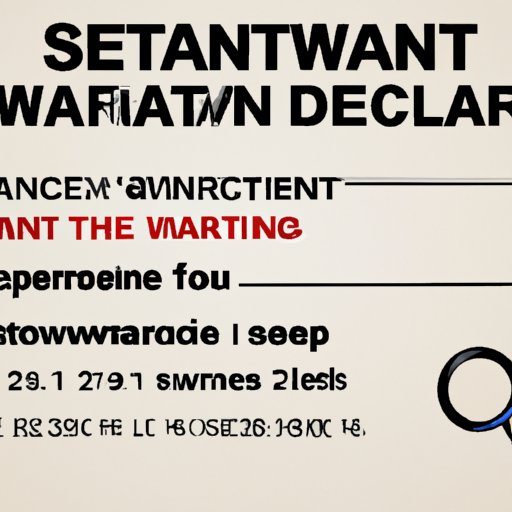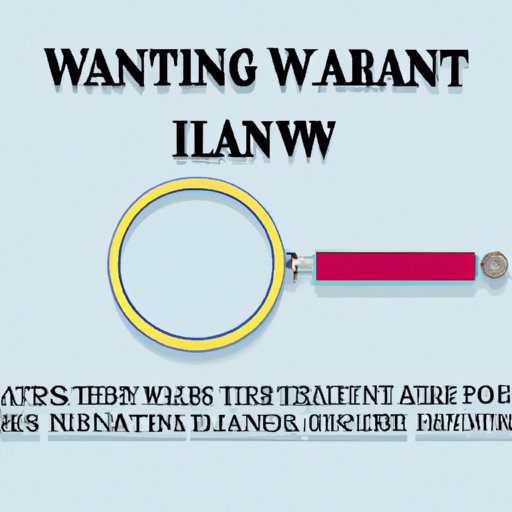Introduction
A search warrant is an order issued by a judge or magistrate that authorizes law enforcement officers to enter a specific location to search for evidence of a crime. The purpose of a search warrant is to ensure that the Fourth Amendment rights of citizens are not violated when law enforcement conducts searches of property or persons.
The legal process for obtaining a search warrant can vary depending on the jurisdiction. Generally speaking, law enforcement must demonstrate probable cause to a judge or magistrate that a crime has been committed before they can request a search warrant. Probable cause is a reasonable belief that a person has committed a crime based on facts or circumstances. Once the judge or magistrate is satisfied that there is sufficient probable cause, they will issue a search warrant.
Exploring the Legal Process: How Long Does it Take to Get a Search Warrant?
Once a law enforcement officer makes the decision to seek a search warrant, they must begin the process of submitting paperwork to the court and gathering the necessary evidence to support their request. This process can take anywhere from a few hours to several days, depending on the complexity of the case. Here’s what you need to know about obtaining a search warrant and the timelines involved.

What You Need to Know About Obtaining a Search Warrant: The Timelines Involved
In most cases, it takes approximately two to three hours for law enforcement to obtain a search warrant. The process starts with a law enforcement officer completing a sworn affidavit detailing the reasons why they believe a search warrant is necessary. This affidavit is then presented to a judge or magistrate who reviews the document and makes a determination as to whether or not probable cause exists. If the judge or magistrate finds that there is sufficient evidence to support the search, they will sign the search warrant.
In some cases, the process can take longer. For example, if the case involves complex evidence or a lengthy investigation, it may take more than two to three hours to complete the paperwork and present it to the judge or magistrate. In addition, if the judge or magistrate has questions or needs additional information, the process can be delayed.

A Closer Look at the Steps Required to Secure a Search Warrant and its Timeline
The process of obtaining a search warrant begins with the law enforcement officer or investigator writing up an affidavit. This document will detail the evidence that the officer believes supports the need for a search warrant. The affidavit will include details such as the names of witnesses, the location of the property to be searched, and other relevant information. Once the affidavit is completed, it must be reviewed and approved by a judge or magistrate.
Once the judge or magistrate approves the affidavit, the officer must file the paperwork with the court. This includes filing the affidavit along with the search warrant form. Depending on the jurisdiction, this process could take anywhere from a few minutes to several hours. Once the paperwork is filed, the judge or magistrate will review the documents and make a determination as to whether or not probable cause exists. If the judge or magistrate finds that there is sufficient evidence to support the search, they will sign the search warrant.
In some cases, the judge or magistrate may ask for additional information or clarification before signing the search warrant. This could include requesting additional documentation or conducting further investigation. In these cases, the process may be delayed while the officer gathers the necessary information.
How Quickly Can Law Enforcement Get a Search Warrant?
It is possible for law enforcement to obtain a search warrant quickly, depending on the circumstances. According to a study conducted by the U.S. Department of Justice, the average time for law enforcement to obtain a search warrant was approximately two to three hours. However, this time frame can vary depending on the jurisdiction, the complexity of the case, and the availability of the judge or magistrate.
In some cases, law enforcement officers may be able to get a search warrant within minutes if they have already gathered all the necessary evidence and paperwork beforehand. However, this is not always possible and the timeframe for obtaining a search warrant can still vary greatly depending on the situation.

Breaking Down the Process of Getting a Search Warrant: Time Expectations
When trying to understand how long it takes to get a search warrant, it’s important to consider all the steps involved in the process. Generally speaking, the process can take anywhere from a few minutes to several days, depending on the complexity of the case. Here’s a closer look at the duration of the search warrant acquisition process and what to expect in terms of timelines.
Examining the Length of Time for Law Enforcement to Receive a Search Warrant
As previously mentioned, the length of time it takes for law enforcement to receive a search warrant can vary depending on the jurisdiction and the complexity of the case. Generally speaking, it takes approximately two to three hours for law enforcement to obtain a search warrant. However, this timeframe can be shorter or longer depending on the situation.
For example, if the case involves complex evidence or a lengthy investigation, it may take more than two to three hours to complete the paperwork and present it to the judge or magistrate. In addition, if the judge or magistrate has questions or needs additional information, the process can be delayed.
The Duration of the Search Warrant Acquisition Process: Understanding the Timeline
When considering the timeline for obtaining a search warrant, it’s important to note that the process can vary greatly depending on the situation. Generally speaking, it takes approximately two to three hours for law enforcement to obtain a search warrant. However, this timeframe can be shorter or longer depending on the complexity of the case and the availability of the judge or magistrate.
In some cases, law enforcement officers may be able to get a search warrant within minutes if they have already gathered all the necessary evidence and paperwork beforehand. However, this is not always possible and the timeframe for obtaining a search warrant can still vary greatly depending on the situation.
Conclusion
Obtaining a search warrant is a complicated process that requires careful consideration and adherence to strict timelines. The legal process for obtaining a search warrant can vary depending on the jurisdiction, but generally speaking, it takes approximately two to three hours for law enforcement to obtain a search warrant. In some cases, the process can take longer depending on the complexity of the case and the availability of the judge or magistrate.
(Note: Is this article not meeting your expectations? Do you have knowledge or insights to share? Unlock new opportunities and expand your reach by joining our authors team. Click Registration to join us and share your expertise with our readers.)
